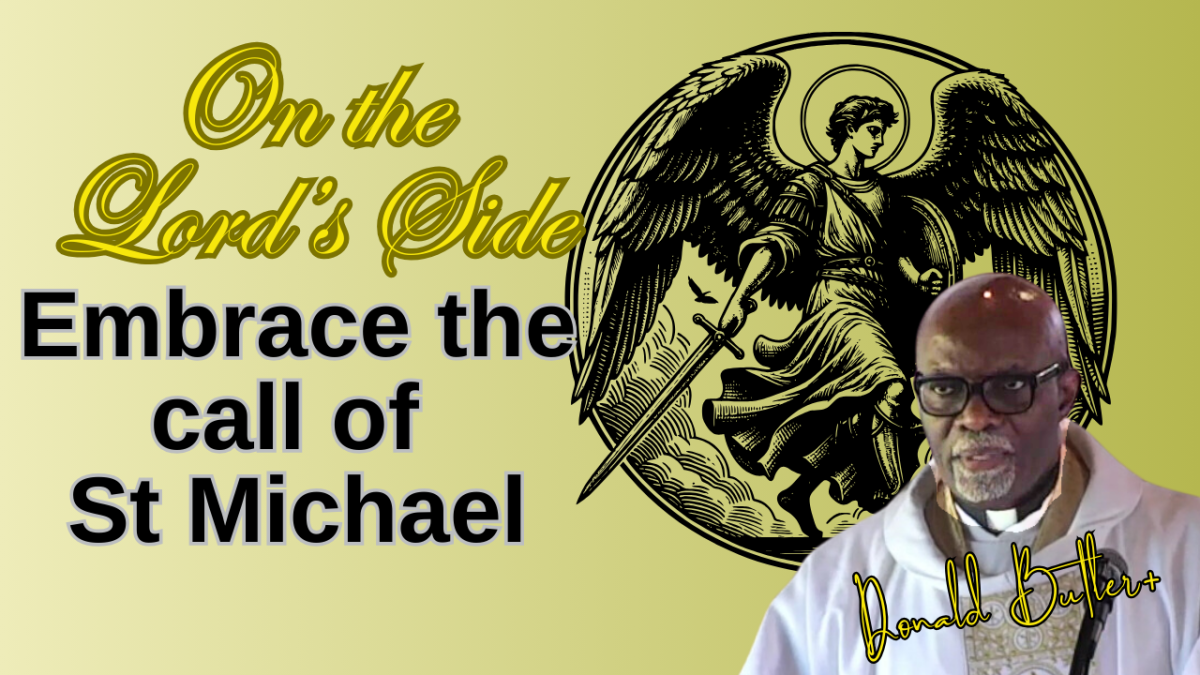Embrace St. Michael’s Call
 It’s a great day to be here, worshiping with you. Today, we honor Saint Michael and all angels, a feast dedicated to recognizing Michael’s and the angels’ roles in the Christian faith.
It’s a great day to be here, worshiping with you. Today, we honor Saint Michael and all angels, a feast dedicated to recognizing Michael’s and the angels’ roles in the Christian faith.
As a child, I attended St. Michael’s Primary School in Antigua, run by Anglican nuns. Every Wednesday, we gathered for mass to worship and learn the fundamental principles of the Christian faith. The school’s motto, “On the Lord’s Side,” called us to align our lives with Christ in every aspect. We sang the school song with conviction:
“Who is on the Lord’s side? Who will serve the King? Who will be his helpers, others lives to bring?”
During my primary school days, my knowledge of who St. Michael the Archangel was grew. The nuns and teachers emphasized his role as a heavenly warrior and the model we, the students of St. Michael’s School, should mold our lives upon. They reminded us that, like Michael, we too are called to defend our faith.
As I grew older, I noticed that many homes in Antigua had a picture of St. Michael the Archangel somewhere in the house. Michael was pictured with his foot on the devil’s head. This powerful imagery depicted victory over evil and the protection God provides through His angels. These images also served as reminders to defend the faith we profess.
The Spiritual Battlefield
In Christian theology, spiritual forces, both divine and evil, shape our lives. God, the Holy Spirit, and the angels work to guide, protect, and strengthen us, while Satan and the demons try to deceive and lead us away from God. Ephesians 6:10-18 urges us to put on the full armor of God—faith, righteousness, truth, peace, salvation, and prayer—that we can use to bolster our faith and strengthen our belief in God through Jesus Christ.
Michael’s triumph over the devil vividly illustrates how divine forces overcome evil when we stand firm in the faith. Just as Michael was victorious in the war against Satan, we are empowered by God to resist the devil’s schemes in our time.
The Reality of Spiritual Warfare
The first conclusion we can draw from Michael’s example is that spiritual warfare is very real. We struggle with various issues in our lives: ethical dilemmas, questions of right and wrong, and moral conflicts. The ever-present struggle between good and evil is evident in our news streams and our personal lives, where we wrestle with morality and the values of our children.
Michael’s role as a heavenly warrior shows that we are engaged in a battle not of flesh and blood but of spiritual forces. As James 4:7 tells us, “Resist the devil, and he will flee from you.” Like Michael, we must stand firm against the temptations and lies that we encounter. Yet, we do not fight alone. We have Christ’s strength and His angels’ presence to help us in these battles.
When overwhelmed by doubt or fear, when enemies try to make us feel unworthy or far from God, we must remember Michael’s example. The victory has already been won through Christ’s death and resurrection. By His grace divine, we are on the Lord’s side, secure in His love. The forces of evil that torment us daily have no claim on us.
Angels: Helpers and Protectors
The second point of reflection is that angels are not just celestial beings but helpers and protectors. Throughout the Bible, angels appear during significant moments, guiding, warning, and comforting God’s people. Psalm 91:11 promises, “For he will command his angels concerning you to guard you in all your ways.”
Angels like Michael are actively involved in our lives at God’s command, helping us stay connected to God’s love and protection. They guide us using God’s power and defend us in spiritual battles that we cannot always see or comprehend. When we face struggles, we can pray for help and guidance, confident that God provides assistance through His angels.
We are called to be warriors for good, to stand up for what we know is right and just. Michael’s very name, which means “Who is like God,” challenges us to live lives that reflect God’s goodness and justice. Like the angels, we are not passive recipients of God’s grace but active participants in His plan.
Called to Action
We are all called to ministry, actively involved in God’s plan of salvation, grace, and goodness. As Peter warns in 1 Peter 5:8, “Your adversary, the devil, prowls around like a roaring lion seeking someone to devour.” We must resist evil not only for our sake but for the sake of the world around us. We fight for peace and ensure that everyone has the opportunity to live without fear, fulfilling God’s call on our lives.
As Michael led the angels against Satan, we are called to fight for justice, kindness, and mercy in our communities. This means standing up for what’s right, loving our neighbors, and remaining faithful to God despite worldly temptations.
Conclusion
As we celebrate today and uphold the example of Michael and all the angels, let their ministry inspire us and call us to action. Their actions remind us that we are never alone in our spiritual journey. We are surrounded by heavenly forces working for our good and for the glory of God.
Let us take up the call to stand firm in the faith, resist darkness, and serve as warriors for good in the world. May we always sing in our hearts, “Who is on the Lord’s side? By thy grace divine, we are on the Lord’s side. We are on the Lord’s side.” May we remain soldiers of Christ today as we seek to do His will now and always.
Amen.
